Construction Management Books Black Friday and Cyber Monday SaleUp to 50% off kindle ebooks on Amazon.com and Amazon.UK this Black Friday and Cyber Monday weekend. Offers end this Monday. Check out the great deals.
A great opportunity to brush up on your construction project management skills.
0 Comments
Construction companies around the world are complaining about a shortage of people, and in particular a shortage of skilled people. The war for talent: How contractors battle for workers. In fact contractors blame poor quality, late completion, low productivity, increasing costs, and poor project performance on a lack of skills. Is this true? If it is, how can contractors improve the situation? The construction skills shortage seems to be worsening. Construction is perceived as a dirty and unsafe industry, where people are expected to work long hours for sometimes low wages. Indeed construction has a poor reputation which deters new entrants. Making the problem worse is the transitory nature of construction. Many construction companies dump their workers when a project is completed, with little reward for hard work or loyalty. Countless workers have no job security and know that once their project is complete they must start looking for another job. After a few cycles of this it’s no wonder that good skilled people leave the industry and move on. Older skilled workers are retiring while the younger generation doesn’t appear interested in a career in construction. Yet despite this outcry of a lack of skills some construction companies are doing little to retain the skilled people they have. They are certainly doing little to improve the image of the construction industry, and few contractors seem willing to upskill their workforce, or employ newly qualified people and train and mentor them. Nor do contractors think innovatively for new sources of people. It all seems too hard for the average contractor, who seems content rather to use the lack of resources as an excuse for poor construction project outcomes. After all, if there’s not a suitable experienced and qualified person waiting on the street corner for a job it must mean that there is a shortage of workers in construction! So how can construction companies improve the skills shortage? Well here are a few suggestions #constructionmanagement #constructionskillsshortage Tips to overcoming the construction skills shortageStaff retention It’s pointless employing new people to fill gaps when they don’t stay long, and others in the organisation leave, creating more gaps. Some contractors are in a perpetual cycle of filling voids left by people leaving the company. A cycle that can’t be won unless you take proactive steps to retain people. Now retaining people is a topic on its own which I’ve previously covered in several articles: How do we retain skilled employees in construction? and High Employee turnover? The sooner you know the better. So, start by retaining good people in your company and project. #staffretention Is your company a good place to work? Linked to the above is the question, ‘is your company a good place to work?’ If it isn’t then you are going to find it harder to attract people to your company and project. And when several contractors are fighting to employ the same person, if your company isn’t the employer of choice then the limited talent will go elsewhere. So honestly ask yourself, ‘is your company a good place to work?’ But not in your position, a role where you may enjoy particular perks and advantages, but rather in the position you are recruiting for. So if it’s a carpenter, supervisor, foreman, or whatever, how would a carpenter, supervisor, foreman, view your company, your project, compared to other contractors, and even other industries? Is the position and role your company is offering better than elsewhere? Learn to see your company as others see it. Ask prospective employees what they’re looking for in an employer and you’ll probably find that it’s not only about the best salary. People are generally looking for a company that values and respects them, they want some job security, of course they want a safe place to work, and a fair wage. People want to work for good managers and successful companies. Again this is a topic on its own, and I’ve written several articles on this including Is There Bullying on Your Construction Projects and Respect in construction - why it's important Ensure your company is a great place to work, where people want to work. Look within the company for people to fill the role Some contractors overlook people already working within the company. Is there someone within the organisation that can fill the position? Maybe they just need to be offered the role, and perhaps some extra training? Sure they may leave a vacancy where they are currently working – but maybe it will be easier to fill their position? In promoting someone within the company you’ll be rewarding the person, for which they’ll be grateful, and others within the organisation will see that there are prospects within the company to advance, grow, and take on new responsibilities and roles. When I became the general manager of a new division/branch of our company, in 5 years we grew the division by 8 fold, also increasing profits 8 fold, and this was almost done entirely without employing new management. We were able to find and promote people from within our organisation to fill the additional roles of foremen, project managers, and directors. Ask your project managers, supervisors, foremen, managers, is there someone they know working for them who can fill the position that’s needed. Sometimes managers have to be coaxed to put forward good people working for them, knowing that they are going to have a hole in their team, so it’s important for managers to realise that it’s for the benefit of the company, as well as the person they are releasing. So start your search amongst those already working for the company, before spreading your search wider. You may be surprised at the talent hiding in plain sight within your company. Who knows who You’re looking for people – have you asked your employees if they know someone who wants to work for the company – a friend or relative? I’ve sometimes had success this way. If friends and relatives of employees want to work for your company it usually means that your company is an attractive place to work, because your employees are willing to recommend to their friends and relatives to come and work where they are employed. Even ask your subcontractors, clients, suppliers, and the professional team. Spread the word that you're looking for people. If your client, project team, or subcontractors think that your company is a professional outfit with good managers they'll recommend your company as a good place to work. A contractor that is looking to employ people now. Do your employees know you are searching for people? You cannot afford to discriminate Unfortunately many of us have biases towards people, which may be conscious or even unconscious. So we are apt to put people in boxes and exclude them from certain jobs without even knowing their skills or experience. People are simply excluded from a job based on their race, colour, sex, even on how they dress or look, perhaps even excluding an overweight person on the premise that they must be lazy. Some automatically allocate people of a certain nationality to a particular job, assuming all Irish, or New Zealanders, or Mexicans, are only good at a particular task, and disregarding them for an alternative position. What nonsense! Construction is desperate for good people, who cares what they look like or where they come from, as long as they are willing to work and have the right skills employ the person and don’t hold them back for any reason other than they can’t do the job. Again this is a topic that I’ve previously written about Discrimination in construction – is it holding your company back? Are you excluding a large portion of the population from your search because of your biases? Drop the excuses There are some perennial excuses that companies use not to employ someone looking for work. Let’s consider how stupid some of these are!
Are your excuses for not employing someone valid, or are you simply regurgitating time worn excuses? Do you even know why you don’t employ some candidates? To be continuedIn my next article I discuss how you can cast your search wider, and how construction needs an image makeover to attract the next generation of construction workers. #constructioncareers #contractors #constructionindustry © 2021 This article is not to be reproduced for commercial purposes without written permission from the author. Do you want to learn how to manage construction projects successfullyPaul Netscher has written several easy to read books for owners, contractors, construction managers, construction supervisors and foremen. They cover all aspects of construction management and are filled with tips and insights.
Visit to read more. The books are available in paper and ebook from most online stores including Amazon. In my previous article 10 tips to successfully pricing your next construction project I discussed how some contractors take the shotgun approach to pricing and quoting construction projects. Literally submitting hundreds of prices in the hope that they will win a few projects. This leads to overwork of the estimators, and in some cases owners or project managers involved in pricing projects. It results in wasted effort, but more seriously it could lead to mistakes and winning projects with a price below what it’s going to cost the contractor to build the project. Unfortunately the shotgun approach could also mean that the contractor misses out on good projects which the contractor could have won if they had put more effort into their quotation and price submission. In this article I’ll discuss another 10 more tips to successfully pricing and winning projects. #pricingconstructionprojects #constructionbids #constructiontenders More tips for pricing construction projects 1. Understand the quality requirements. Are they standard, and can you deliver the requirements? 2. Price the project from first principles. This means:
5. Check the project cashflow. Even a profitable construction project can destroy a company if the contractor can’t manage the cashflow. Negative cash flow – the death for many construction companies. So does your company have the finance available to pay for things while waiting for payment from the client. Most construction projects are cashflow negative until the end of the project. Larger construction projects usually require more cash, as do projects which require expensive materials, and projects that require a large amount of work in a short time frame. 6. Check:
9. Prepare your price submission so that it looks professional.
Finally make sure your price is delivered to the required person on time. The next stage of the project price submission process But even when the project price is submitted it doesn’t mean the process is completed.
Winning the right construction projects at the right price In our 2 articles on pricing construction projects we discussed how important it is to have good market intelligence – what construction projects are coming out to price, and what your competitors or other contractors are up to. It’s important to understand all aspects of the construction project – the client, the contract document, and the project site conditions. Then develop an accurate price – based on an accurate construction schedule and the local market conditions, using the best construction methods suited to the project and the available resources. Finally submit a professional quotation that includes all the documentation requested, and importantly which sells your company’s abilities and why you are the right contractor for the construction project. Pick the right construction project to price, a construction project you want and one you can win from your competitors, then put all effort into winning the project. Finally don’t lose the project or make a stupid mistake in the negotiation phase. #constructionprojects #contractors #constructionmanagement Other useful articles What do you do when your construction project is LOSING money? Financial checks and controls on construction projects Do you want to learn how to manage construction projects successfullyPaul Netscher has written several easy to read books for owners, contractors, construction managers, construction supervisors and foremen. They cover all aspects of construction management and are filled with tips and insights.
Visit to read more. The books are available in paper and ebook from most online stores including Amazon. Pricing (estimating) a construction project has been described as a science, an art, part luck, and for some just a guess. Getting your price right means you have to win the project with a price that is higher than your final project costs will be, meaning you’ll make a profit. But just because you have the right price (for your company) doesn’t mean that your competitor won’t have a lower price that will be profitable for them. Having a lower price than your competitors also doesn’t mean that you’ll be awarded the project since clients often look for other requirements, and they need to be convinced that you are the right contractor for their project. Unfortunately there are many contractors who submit flawed prices which have little chance of success, or worse, which can lead to the downfall of the company when the price is lower than their final project costs. But there are also many other risks that contractors don’t consider when pricing their projects, these include non-payment, inability to deliver the project to the required standards, lengthy legal disputes, health risk to employees, reputational risks, cashflow problems, and even the risk of losing out on favourable future work. #pricingconstructionprojects #constructionbids #constructiontenders Tips to successfully pricing your construction project 1. Understand your client. You don’t want to work for some clients, particularly those who don’t, or can’t pay. Check whether your client:
2. Understand the project documentation.
3. Know the market and what other projects are coming out for pricing. Good market intelligence is essential. You don’t want to be stuck with a difficult project at a low price while you miss out on other more lucrative and easy projects that are likely to be available in the next few months. Read: Should contractors price every project? 4. Physically check the project site conditions.
5. Understand the opposition (competitors). It may not be worth pricing projects against competitors who are known to be favoured by the client, ones that have a reputation for stupidly low prices, or competitors that are in a position to deliver a cheaper project because they are working in the area or have the right equipment for the project. You may be wasting your time pricing a project which you don’t stand a chance of winning! 6. Understand the project. What is your company responsible to deliver? What will the client supply? 7. Identify and quantify the risks. Prepare a risk schedule. Understand how you can manage and reduce the risks. Be prepared to walk away from projects that are too risky and where the quantum of the risk event could sink the company. Read How to deal with construction risks 8. Know your company’s capabilities. Will you have the people and equipment to do the work? Do you have people with the right experience? 9. Check the available resources. Are materials, people, and equipment available? Will they be available when they are required? 10. Consider the construction methodology. Develop the best methodology taking account of your company’s capabilities, the available resources, the project site conditions, the project schedule requirements, price, safety and the client’s requirements and design. Consider alternative construction methods and products. Conclusion Some contractors take the shot gun approach to pricing projects. Aiming in the general direction of the target and hoping they snag a project. Submitting as many prices as possible, hoping that one will get them a project. Their estimators often work long hours churning out price after price, just hoping that they will have success with one submission. Unfortunately this often leads to mistakes. High prices mean it's another effort in vain. Low prices may land the company a project at a price they cannot do the work for. Rather contractors should pick the right project, then spend time and effort preparing a winning price submission. In my next article I discuss more tips for winning construction bids 10 more tips for pricing construction projects#constructionprojects #contractors #constructionmanagement Other useful articles Negative cash flow – the death for many construction companies some Reasons why projects lose money Top Tips to Cut Costs on Today's Construction Site Do you want to learn how to manage construction projects successfullyPaul Netscher has written several easy to read books for owners, contractors, construction managers, construction supervisors and foremen. They cover all aspects of construction management and are filled with tips and insights.
Visit to read more. The books are available in paper and ebook from most online stores including Amazon. How can Technology help ConstructionCan technology help the construction industry? Productivity has not improved in construction over the last few decades, contrary to most other industries. Why is building so slow and expensive? Contractors have been slow to embrace technology. How can technology help the industry? The future of construction. The use of BIM is becoming more common. Technology is useful to eliminate paperwork and increase productivity. Like these quality checklists. In this blog I share some interesting articles on technology. #constructiontechnology Using Robots in ConstructionHere's a company incorporating technology on their projects. They are even trialling a robot dog as a superintendent. Maybe there are some ideas you can use on your next project? You can use robots to help set out structures. Here's more on robot construction. Robots can be used for drywalling. What about autonomous equipment. Here's an autonomous excavator. #constructionrobots Drones in ConstructionIs there a place for drones on our construction projects? Drones can be used aerial mapping and surveying in hard to reach places, like on roofs and on bridges. They can be used to check quality. Is there place for them to do work in dangerous areas, perhaps even painting bridges? #dronesconstruction 3D PrintingMuch has been said about 3D printing. How will 3D printing change how we construct buildings and structures? Technology Improving Construction SafetySafety is another place where technology can help. You can use remotely operated machines to work in dangerous places. They can do work in extreme temperatures and in difficult conditions. Here's a company using wearable technology to prevent injuries. But technology is also useful in safety training using VR. #constructionsafety #constructionsafetytechnology Overcoming the Risks of Using Technology in ConstructionCan technology make construction safer, more productive, and producing better quality? Can it provide clients with a good end product? Will contractors be more profitable? And will the introduction of new technology attract the next generation of workers to the industry - a generation that has literally been born with a smart phone in hand, who's lives are intertwined with the latest technology? Can technology help your construction project? What are the risks of depending on technology? Indeed contractors must use the appropriate technology and implement it properly. Here are some questions contractors should ask . Cybercrime is on the rise. Contractors must be vigilant to protect against cybercrime. It's important to build trust between workers and robots and autonomous machines. ConclusionConstruction must use technology. Contractors can achieve enormous benefits from new technology. However technology cannot make a bad contractor good. Technology cannot make a poor construction project manager good. Technology can make good contractors better. Technology used correctly can make good construction project managers better and more productive. Contractors must adapt new ways of doing things better. But they must choose the right technology and ensure their teams use the technology correctly. It's time for construction to move into the 21st century. #constructionmanagement
Other useful articles Time management Why is there poor productivity on your construction project? Busted: 12 Construction Myths Do you want to learn how to manage construction projects successfullyPaul Netscher has written several easy to read books for owners, contractors, construction managers, construction supervisors and foremen. They cover all aspects of construction management and are filled with tips and insights.
Visit to read more. The books are available in paper and ebook from most online stores including Amazon. |
Archives
June 2024
Note: We welcome genuine comments, especially comments that add additional information to the subject matter in the article. We however reserve the right to remove inappropriate comments, which includes comments that have nothing to do with the subject, comments that include inappropriate language, and comments that are an advertisement for a product or company, or which include an advertising link. Comments must be in English. We will not enter into discussion on why a particular comment was removed.
CategoriesCopyright 2016 - The attached articles cannot be reproduced for commercial purposes without the consent of the author.
The opinions expressed in the attached articles are those of the writer. It should be noted that projects are varied and different laws and restrictions apply which depend on the location of the contractor and the project. It's important that the reader uses the supplied information taking cognisance of their particular circumstances. The writer assumes no responsibility or liability for any loss of any kind arising from the reader using the information or advice contained herein. "I have what I consider some of the best books on construction management."
Books are available from: Amazon.com Amazon.co.uk takealot.com kalahari.com Amazon.in Amazon.de Amazon.fr Amazon.it Amazon.com.au Powell's Fishpond uread bokus Amazon.ca Amazon.es Other retail stores Available in paperback or on Kindle "28 YEARS OF CONSTRUCTION PROJECT MANAGEMENT EXPERIENCE, DEVELOPING SUCCESSFUL CONSTRUCTION PROJECT MANAGERS AND BUILDING SUCCESSFUL CONSTRUCTION COMPANIES"
|
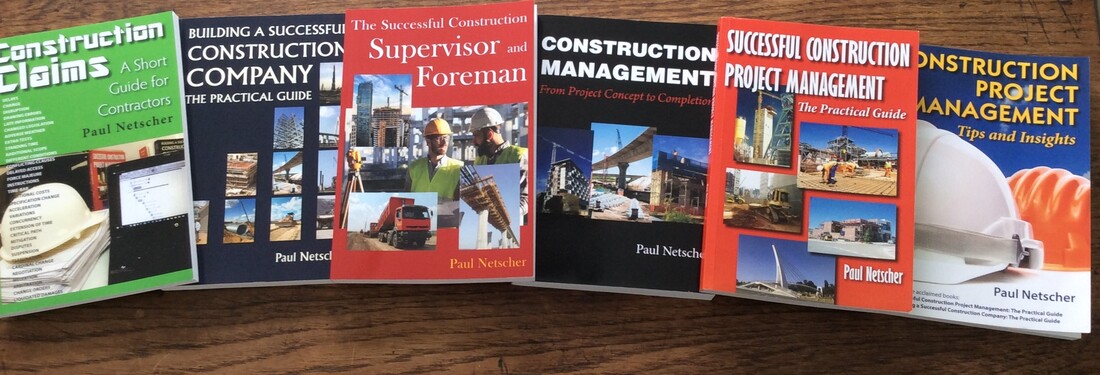
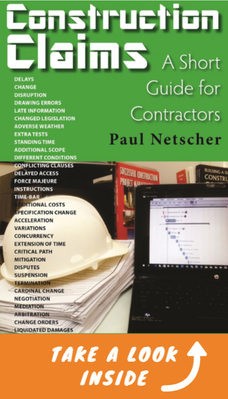
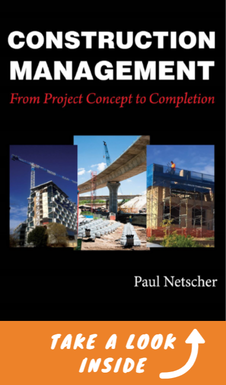
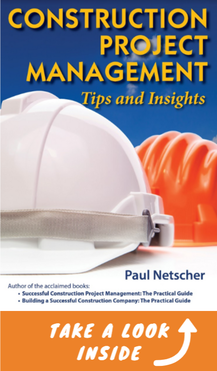
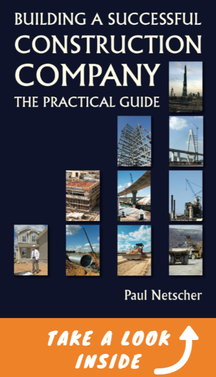


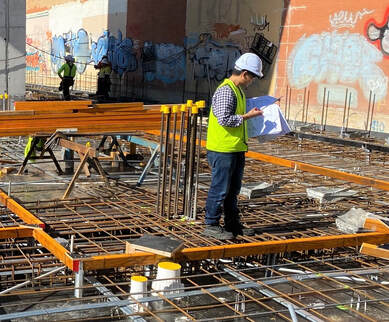
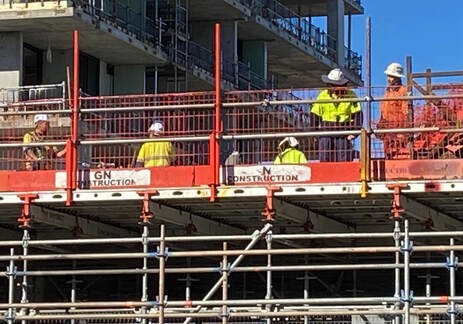
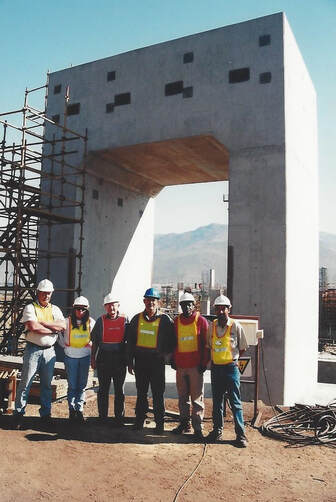
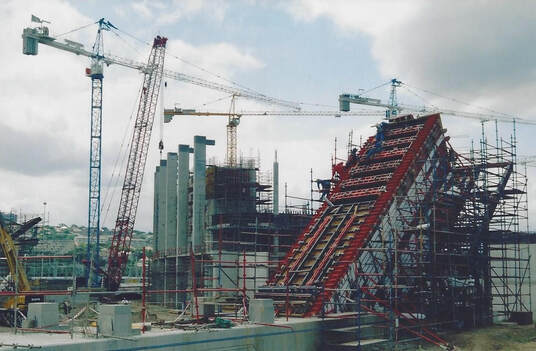
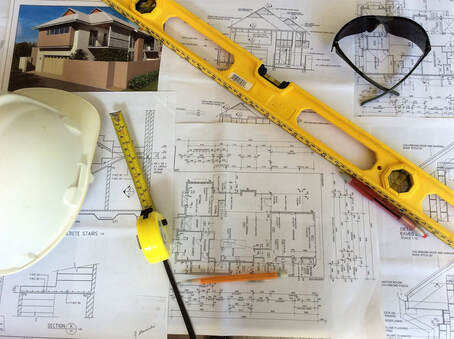
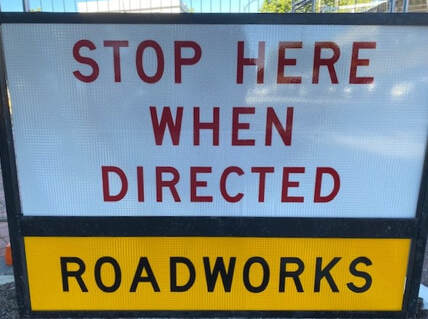
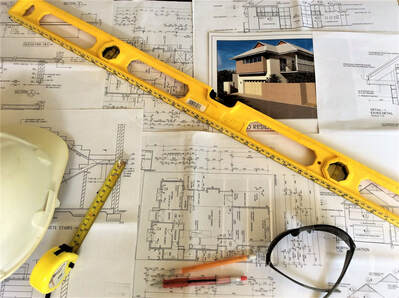


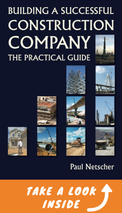
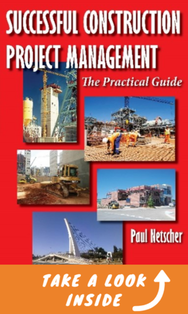

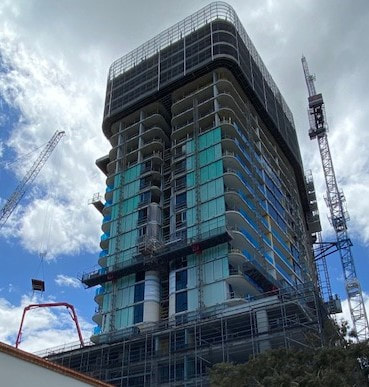



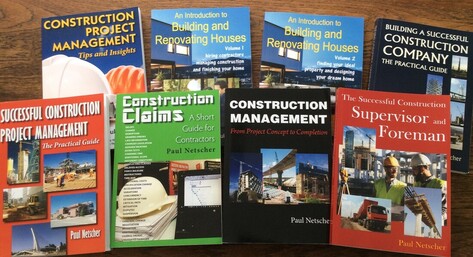


 RSS Feed
RSS Feed




